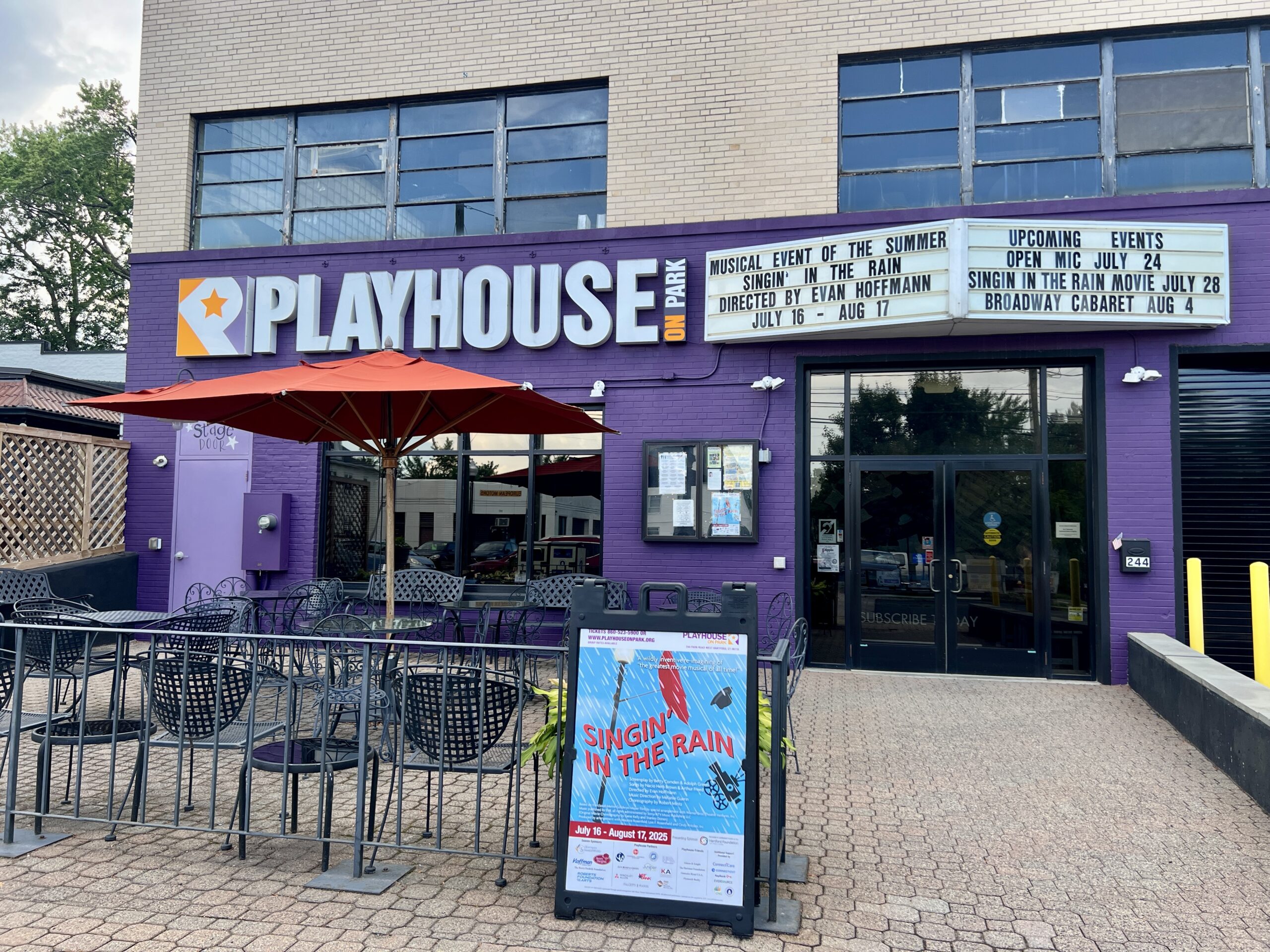‘I’m Just Bare Bones Here’: West Hartford Gyms, Yoga Studios Work to Outlive COVID-19

Audio By Carbonatix
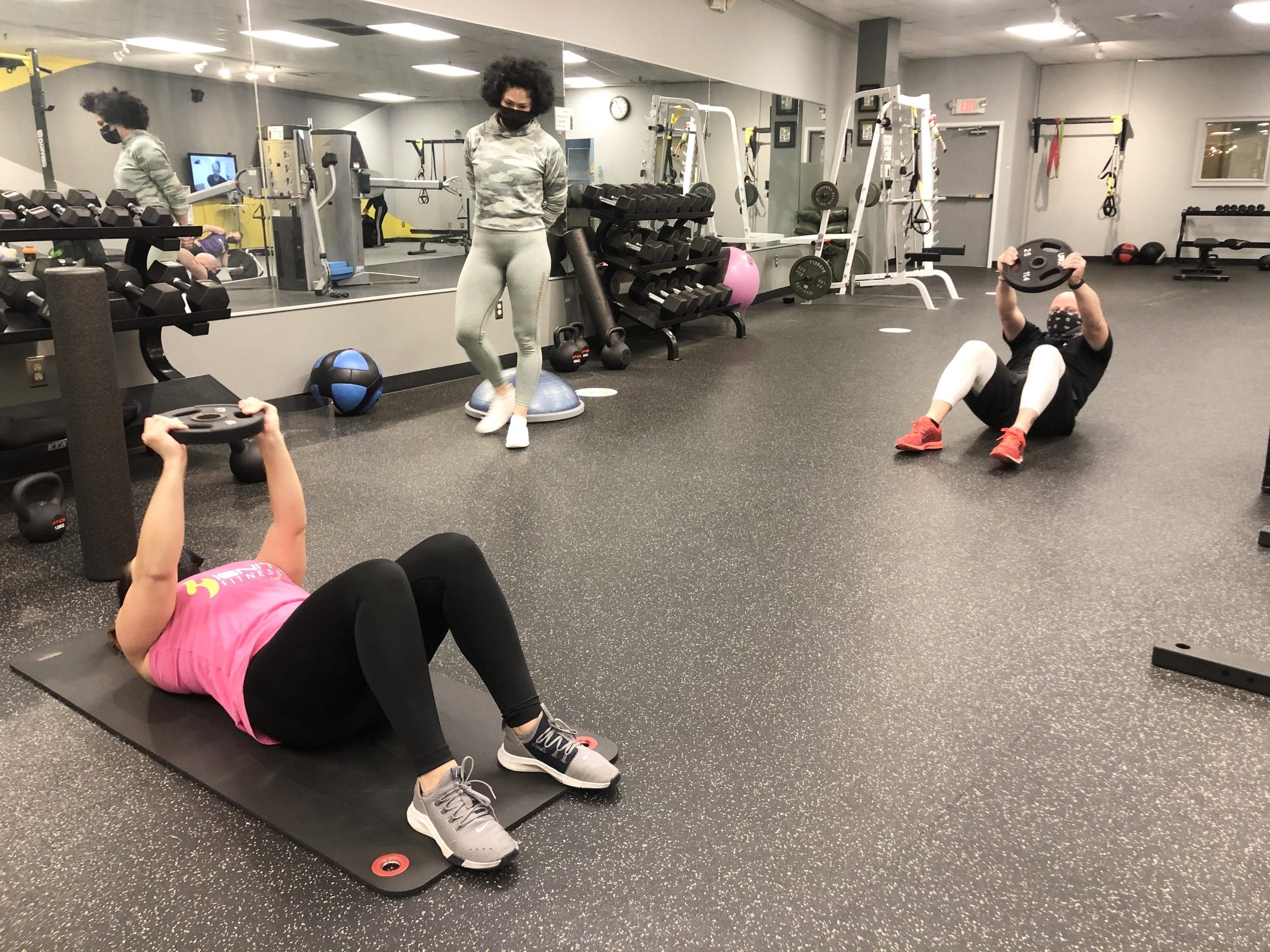
Ignite Fitness clients work out distanced, wearing masks. Courtesy Kim Zengerle
West Hartford’s fitness and yoga studios are fighting to survive amid the state’s COVID-19 restrictions, going above and beyond to keep members safe.
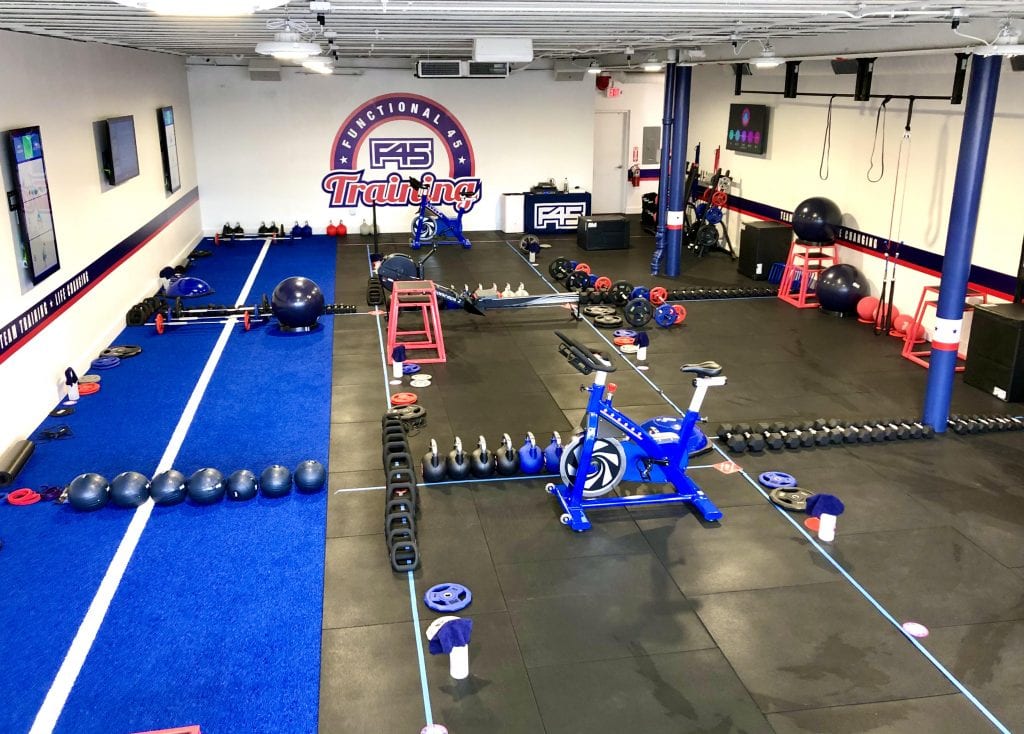
F45, which is preparing for its grand opening in Bishops Corner, has ample space for COVID-safe workouts, and has many other safety measures in place. Courtesy of Lauren Lansing
By Kristina Vakhman
At a time when staying physically and mentally healthy is paramount to voiding off the coronavirus, West Hartford’s small gyms and yoga studios are fighting to survive.
“We’re trying to suffer through the storm and hopefully come out the other end,” said Kimberly Zengerle, owner of Ignite Fitness.
COVID-19 has been bad for fitness studios. Town Sports International, parent company of New York Sports Club, filed for Chapter 11 bankruptcy this fall, and the West Hartford location shuttered abruptly the first week of October. National chains like 24 Hour Fitness and Gold’s Gym filed for bankruptcy because of the pandemic, and less than half of Americans say they feel comfortable going to the gym.
It doesn’t help that gym cliches like breathing hard, sharing equipment, and taking showers in close spaces are now associated with the spread of the coronavirus. Fitness studios were deemed high-risk environments at the start of the pandemic and have been working hard to ease public apprehension ever since.
“I’m doing everything I can to follow the rules and keep my business alive. We’re one of very few that are going to survive this,” Annie Quagliaroli, co-owner of The Yoga Shop, said.
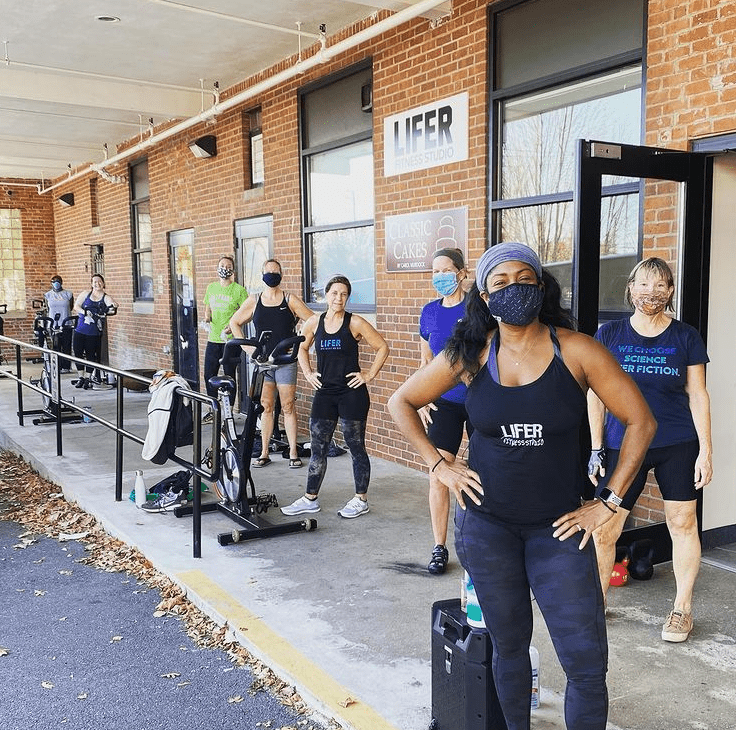
During the warm weather and well into fall, LIFER Fitness was able to hold classes outdoors. Courtesy of Deb Fountain
West Hartford’s fitness centers got creative during the summer. LIFER Fitness Studio, for instance, rolled its cycling classes outside, and owner Deborah Fountain rents her bikes out for a monthly fee. But with the arrival of cold weather, centers are left to look for alternative routes to make revenue – and even that money is not always enough.
“I’m not making the money I did before. Not even half. Maybe a third. Maybe,” Fountain said, adding that attendance went down after outdoor classes ended. She spends the only money she makes on payroll and rent. “I’m just bare bones here. It’s not good. I have to be honest. This is week by week. I’m just barely surviving.”
Connecticut recently added new restrictions to gyms, including mandatory mask-wearing and a limit of 25% capacity. That means that at places like The Yoga Shop — which can normally hold 96 people but keeps classes to 11 to allow for adequate spacing — only a fraction can show up in person.
“We’re surviving. We’re going to make it through this. But it’s been hard,” Quagliaroli said. The Yoga Shop’s classes sell out each week and community support has been great, she continued. It’s refreshing, especially when her instructors have taken pay cuts and she’s seen other yoga businesses around her close. The Shop’s planned new Avon location hasn’t been able to officially open because of COVID-19.
Small gyms are going above and beyond to bring customers back in. Hand sanitizer stations, extra equipment so no one has to share and appointment-only work-outs are commonplace, as are virtual options. Centers like Ignite Fitness have put a lot toward technology for online classes, which are essential in the event of a complete shutdown.
Shaun Chambers, CEO of Bodyroc, said that the studio has spent “thousands of dollars” on hospital-grade disinfectant solutions and sanitizes before and in between sessions.
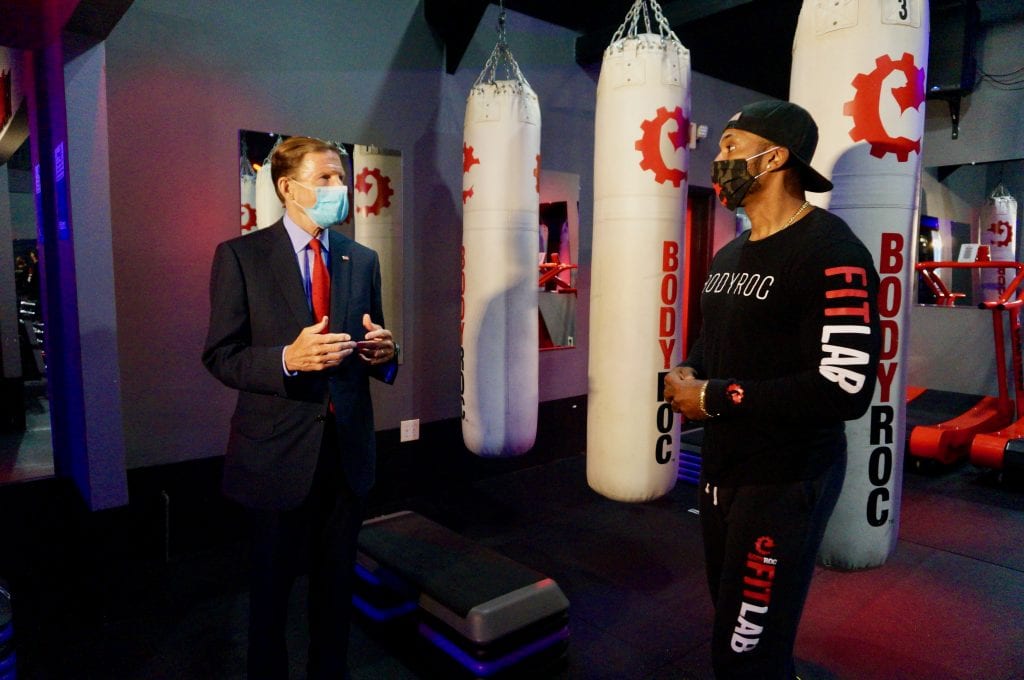
Shaun Chambers (right) owner of BodyRoc Fit Lab, explains some of the measures he has taken to keep members safe during a visit with Sen. Richard Blumenthal over the summer. Photo credit: Ronni Newton (we-ha.com file photo)
“We’re doing more cleaning than we are training, which is crazy,” Chambers said, noting that it’s hard to get back that money at 25% capacity and when 60% of his revenue has been hit. “It’s been a fight to figure out how to sustain ourselves until things change. Even then, we’re concerned about the psyche of everyone.”
At F45, owner Lauren Lansing said the studio has given out branded masks to all of its members and does temperature checks. On the more extreme side, F45 has also installed UV air purifiers and air filters, and employs a UV dry disinfectant gun.
The studio hasn’t even officially opened and charged its members yet, but Lansing said she hopes F45 will make back the money spent on all these precautions.
“I’m just thrilled people are coming in and want to work out,” Lansing said, recalling how it was “so cute” when a family all signed up to work out together. “It’s shocking that there are still people out there who didn’t buy a Peloton and want to come in to work out and be around a community.”
Though small gyms and yoga shops have received financial support like the Paycheck Protection Program, that funding has run dry. LIFER’s Fountain said she’s anticipating the new $900 billion pandemic relief package will give some much-needed breathing room.
And in spite of the optimism brought with the coming of the vaccine, there’s always the fear that the state will close studios again. For Zengerle, emotions run high when she thinks about losing Ignite, her staff, and her dreams to that frightening possibility. She said she hopes Gov. Ned Lamont won’t apply a “one-size-fits-all” to fitness.
“Staying healthy should be the main focus right now during a health pandemic. It seems almost counter-intuitive to slow businesses that are directly impacting people’s health and wellness mentally and physically,” Zengerle said.
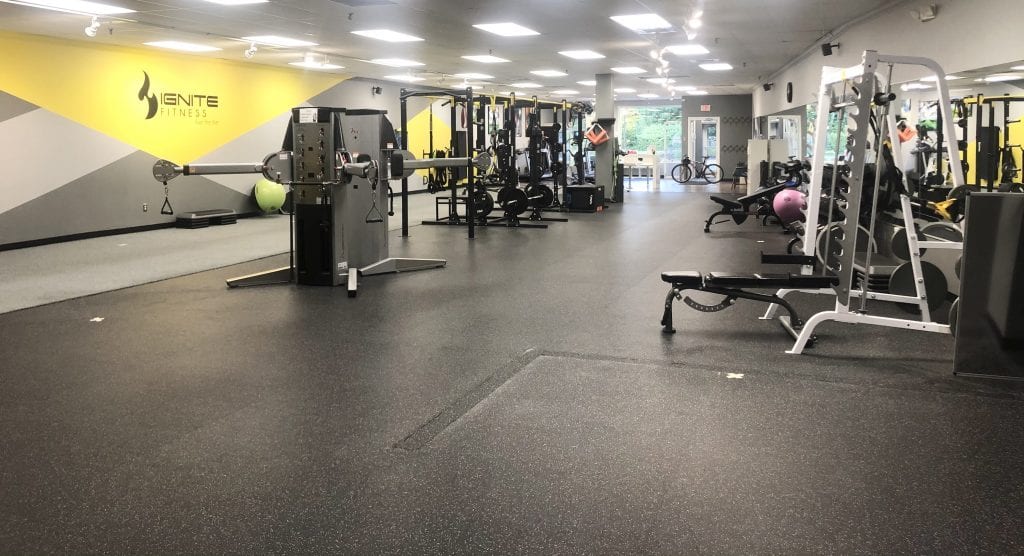
There is plenty of space between equipment at Ignite Fitness in West Hartford. Courtesy of Kim Zengerle
Like what you see here? Click here to subscribe to We-Ha’s newsletter so you’ll always be in the know about what’s happening in West Hartford! Click the blue button below to become a supporter of We-Ha.com and our efforts to continue producing quality journalism.


